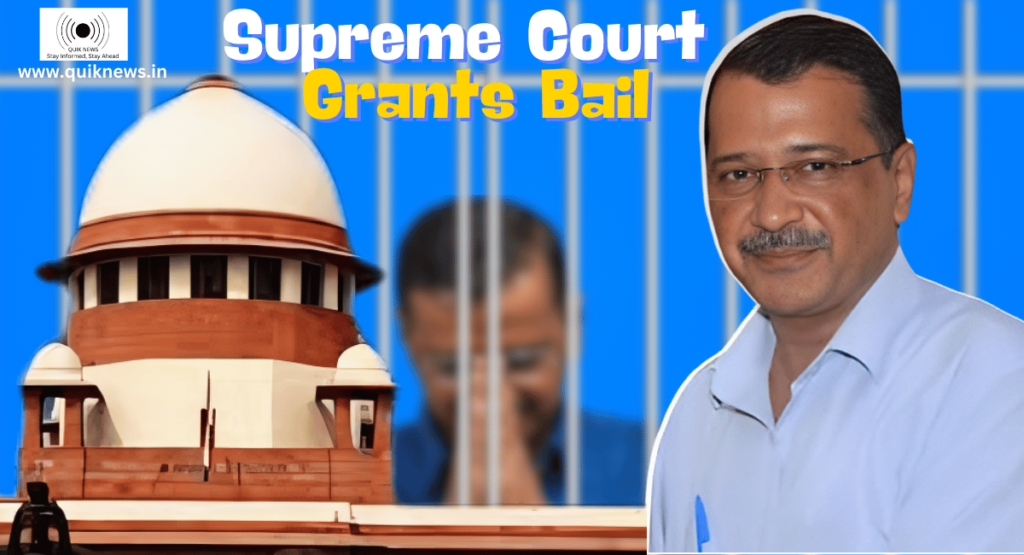The Supreme Court of India recently granted bail to Delhi Chief Minister Arvind Kejriwal in connection with the CBI investigation into the alleged Delhi excise policy fraud. This ruling is a big step forward in one of the most high-profile cases involving the Aam Aadmi Party (AAP) leader. The judicial dispute, which has received extensive media coverage, centers on charges of corruption, mismanagement, and anomalies in the now-defunct Delhi excise policy.
Understanding the CBI Case Against Arvind Kejriwal
The Delhi excise policy investigation, which is being led by the Central Bureau of Investigation (CBI), revolves on allegations that senior Delhi government officials collaborated with liquor licensees to provide disproportionate benefits in exchange for financial gain. The policy, which was established during the COVID-19 epidemic, was designed to reform and modernize the selling of alcohol in Delhi, but it rapidly became embroiled in controversy due to suspected violations.
Kejriwal, the head of the Delhi administration, was embroiled in the controversy. Although numerous other major players, including Manish Sisodia, a top AAP official, had already been arrested in connection with this case, Kejriwal’s involvement was highly debated. The CBI’s charges against him were mostly related to money laundering, kickbacks, and other sorts of alleged financial wrongdoing.
Key Allegations
- Kickbacks to liquor licensees: The CBI claims that Kejriwal and other top officials orchestrated a scheme in which liquor licensees were offered preferential conditions in exchange for bribery.
- Misuse of public office: It was alleged that Kejriwal, as Delhi Chief Minister, used his position to influence policy formulation for personal and political advantage.
- Financial irregularities: Large sums of money, supposedly related to excise policy, were routed through intermediaries and laundered through shell businesses.
While the AAP vigorously refuted these claims, claiming that the policy was intended to repair a dysfunctional system, the scandal escalated, resulting in several arrests and investigations.
Supreme Court’s Decision to Grant Bail

The Supreme Court of India granted Arvind Kejriwal bail on September 13, 2024, after a lengthy legal fight. The court’s decision was noteworthy for various reasons, including far-reaching consequences for the case’s future and Indian political dynamics.
Legal Justifications for the Bail
The bench of Justices Surya Kant and Ujjal Bhuyan delivered a well-reasoned decision, stating that while Kejriwal’s detention by the CBI was valid, his protracted incarceration was unjustified. The following important aspects were highlighted in the ruling:
- Infringement on personal liberty: The court stated that holding Kejriwal in jail for a longer period of time, especially given the length of the trial, would violate his right to personal liberty.
- Completion of the investigation: The court argued that extended incarceration was unnecessary because the CBI had already filed its chargesheet and the investigation had progressed.
- Conditions of bail: The court argued that prolonged incarceration was unnecessary because the CBI had already filed its charge sheet and the inquiry had moved to that point.
The ruling, although providing immediate respite to Kejriwal, also emphasized the constitutionality of the CBI investigation. The court’s verdict has been viewed as a sophisticated approach to the matter because it balances these two features.
Implications for Kejriwal’s Political Career
The bail order has far-reaching political consequences for Kejriwal, his party, and the larger terrain of Indian politics.
Boost in Public Perception
Following his release, Arvind Kejriwal made bold declarations, stating that his commitment had only grown “100 times stronger” as a result of his imprisonment. This narrative appeals to his political supporters, showing him as a leader unfairly targeted by political opponents. His claim that “God supported him because he was right” is likely to appeal to those who regard him as an anti-corruption advocate.
This court struggle could, paradoxically, bolster Kejriwal’s image as a victim of political revenge, especially among his fans. His ability to frame this crisis as a fight against the central government’s overreach will undoubtedly help him in Delhi’s upcoming municipal and parliamentary elections.
Impact on AAP’s Electoral Prospects
While the Aam Aadmi Party (AAP) has experienced difficulties as a result of these charges, the bail order permits the party to refocus on governance and campaigns. The fact that Punjab Chief Minister Bhagwant Mann and other senior AAP leaders publicly welcomed Arvind Kejriwal release, giving sweets and organizing demonstrations, suggests that the party sees this development as a watershed moment.
The timing of this verdict, which comes ahead of important elections in Haryana and Delhi, could provide much-needed momentum to the AAP. However, the shadow of the excise policy issue will linger, and the party will need to carefully control its narrative moving ahead.
The Road Ahead for the Legal Case
Although Kejriwal has been granted bail, his legal case is far from over. The CBI and Enforcement Directorate (ED) are both conducting investigations, and the trial is expected to go a lengthy time.
Key Legal Battles Still to Come
- Trial in the excise policy case: The most immediate problem for Kejriwal is the upcoming trial, which will follow the bail order. While his legal team works to refute the CBI’s evidence, the prosecution’s goal is to prove the corruption charges.
- Continued scrutiny by investigative agencies: Even after the Supreme Court’s verdict, Kejriwal and the AAP remain under scrutiny. Both the CBI and the ED are likely to continue their efforts to unearth new evidence, which could result in future court challenges.
The outcome of these proceedings will not only determine Kejriwal’s political destiny, but may also have a substantial impact on how the Delhi government operates in the coming months.
A Defining Moment in Indian Politics
The Supreme Court’s decision to grant Arvind Kejriwal bail in the Delhi excise policy case marks a critical juncture in his political journey. While it provides him with temporary relief and the opportunity to reclaim the political narrative, the legal and political challenges ahead are formidable. For the AAP, navigating these waters will require a careful blend of legal defense and public relations strategy.
Also Read:- Nestlé Business Services Streamlining Operations for Global Success